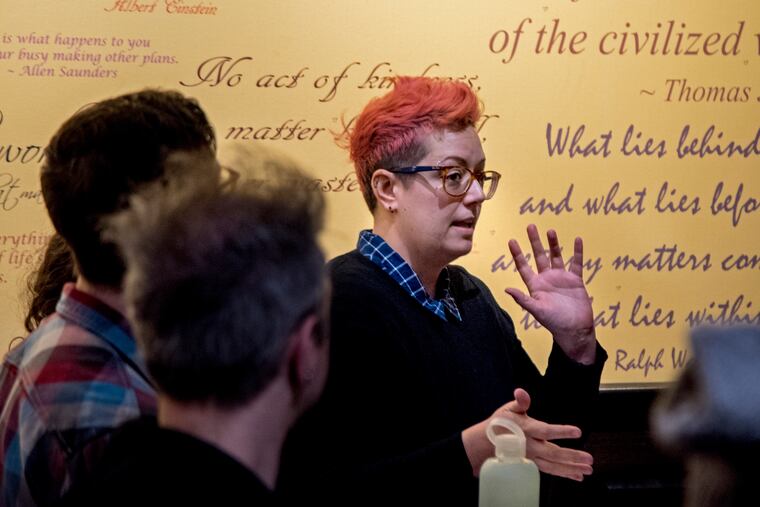Airbnbs and backyard chickens: Collingswood newcomers want more of a say
A Collingswood group energized by local controversies about whether to allow backyard chickens and Airbnbs, and whether a tattoo parlor belongs on Haddon Avenue, is raising questions about the longstanding structure and practices of borough government.

Energized by local squabbles over backyard chickens, Airbnbs, a proposed public safety complex, and other issues, Collingswood Neighbors for Change says business as usual will no longer do in the borough.
Especially business as usually done by Mayor Jim Maley and the two other elected members of the three-person Board of Commissioners — a nonpartisan form of government the borough established 105 years ago.
Neighbors for Change characterizes the commission as insular, defensive, and resistant to fresh perspectives, too hidebound to handle the evolving needs of a once-sleepy suburb that has become more diverse, urbane, and desirable to young people and empty nesters alike.
Newcomers generally favor initiatives such as backyard chickens, Airbnbs, and tattoo parlors, all of which the borough has rejected.
"The character of the town is not going to be harmed by people having more information about, and more of a voice in, how decisions are made,” said Neighbors for Change leader Kate Delany, 39, a reelance writer and mother of two who moved to Collingswood in 2007. She helped create the group in 2018.
“The status quo is to keep the community minimally informed. And when people come [forward], their concerns get waved off as social media drama,” said Jen Rossi, a communications professional and self-described “millennial mom.”
Or, as retired journalist Kathleen Shea Aregood put it: “It’s government by fiat. The impression I get is, ‘Do not criticize me, everything is fine here, go away, get off my lawn.’"
With about 14,000 people living in a little less than two very highly taxed square miles, Collingswood is a ready incubator for debates, disagreements, and civic engagement. A generational change clearly is underway, and there’s a growing sense of disenfranchisement due to the actual and perceived influence of the Camden County Democratic establishment in local affairs.
The exciting, if ultimately unsuccessful, 2016 Democratic primary campaign of local son Alex Law, a fresh young face cheekily seeking to oust U.S. Rep. Donald Norcross, galvanized enough voters to give this political neophyte a win over the incumbent in Collingswood and three other Camden County towns.
Meanwhile, the Trump presidency has inspired progressives, of whom there is no shortage in the borough, to organize and agitate. As Delany wrote last fall in a Camden Courier-Post op-ed: “On the national level, and apparently in Collingswood, too, progressives are struggling to be taken seriously by the moderates with establishment backing.”
I lived in Collingswood in the early 1980s — well before the influx of hipsters, foodies, and LGBTQ families began about 20 years ago — and like many other South Jersey residents, I enjoy the borough’s walkable downtown, first-rate restaurants, and welcoming vibe.
“People are here because they want to be here,” said commissioner Rob Lewandowski.
Collingswood is indeed on a winning streak, and much of the credit belongs to Maley, a savvy, high-octane, thoroughly wired lawyer with considerable expertise in redevelopment matters. And a somewhat thin skin, too.
“Take a look at our town. Measure it against any town you would like,” the mayor, 61, said by phone. "We’re doing fantastically on every front imaginable, OK? So until something’s broke, I don’t know what we’re supposed to fix.
“Has Collingswood done things according to the status quo in the last 20 years? No. We’ve done things aggressively and totally differently. What do they want to do? What is their ‘not the status quo’ idea? Chickens? Airbnbs? If they’d gotten what they wanted, you and I wouldn’t be having this conversation.”
First elected to the commission in 1989 and voted into the mayor’s office by his fellow commissioners since 1997, Maley said having a three-member governing body is efficient.
“I’m hearing that we need to be transparent, but we have the Town Crier, we have email blasts, and we make videos,” he said. "Tell me where we’re not transparent.”
I called up Delany to ask her.
“We never see the commissioners have the conversations. We never hear their deliberations,” she said. “We want more of a dialogue.”
Without a public work session, or caucus, before its regular meeting, the commission nevertheless generally votes expeditiously and unanimously on its monthly agenda, she said.
“If they’re having conversations beforehand, and obviously they are, someone is supposed to be taking the minutes,” said Delany. “But the public can’t access any of that.”
Joan Leonard, a commissioner for the past 20 years, said board members "interface with the public and with our departments day and night. People email, and call, and knock on the door. They come to our [monthly] meetings. They bring things up at our town forums.”
The notion there’s a lack of transparency “is baffling to me,” said Leonard. "I can’t imagine a government that interacts more, and has less bureaucracy, than Collingswood."
I don’t doubt that Maley, Lewandowski, and Leonard work hard on behalf of their town. But Collingswood’s transformation did not happen just because of government, but also because of partnerships like those that made possible the success of the Farmers Market and the Book Festival.
"The goal, as far as I’m concerned, is to make a good town better,” said Aregood.
So, commissioners: How about a partnership with Collingswood Neighbors for Change?